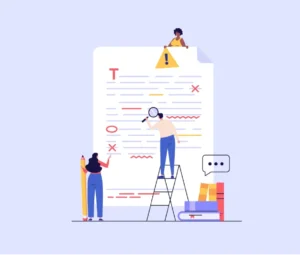Our Tips for Buying Property to Rent
 Are you looking to enter the world of real estate investing? A big first step for any potential investor is buying property to rent out. Especially since there is a difference between buying rental property and buying a primary residence.
Are you looking to enter the world of real estate investing? A big first step for any potential investor is buying property to rent out. Especially since there is a difference between buying rental property and buying a primary residence.
A rental property is one of the largest assets you can invest in — and that can be daunting! But it doesn’t have to be. Although there are many steps to take and details to iron out when you’re buying rental property, once done you can begin to generate passive income.
According to the IRS, rental income is recognized as passive income. The benefit of this grouping is that this means real estate investors aren’t subject to self-employment taxes. However, the actual process of running a rental property is anything but passive.
So, what about those steps and details? Well, AAOA is here to help you figure out one of many ways to find a potential property, get a mortgage and get started on your renting journey.
Important note: Keep in mind there are many different ways to purchase property to rent and not all methods work for everyone. While we won’t be able to cover every investment type and purchase method, we hope you’ll find this information helpful. Read on and explore our guide to buying rental property for the first time.
How to buy an investment property to rent
Buying rental real estate can be a great investment opportunity. Below we explain some of the steps you may take to tap into that market:
Identify your preferred rental property area or neighborhood
To determine the right rental property to invest in, start by narrowing down the neighborhoods that work best for your investment strategy. This may mean identifying which neighborhoods will help you increase the value of your property — instead of detracting from it.
Look at the following qualities for neighborhoods:
- School district
- Employment rates
- Rent rates
- Rental vacancy rates
- Crime rates
- Public transportation options
- Property tax rates
- Proximity to value-add amenities (e.g., parking, grocery stores, shopping centers, etc.)
Identify the rental property you should buy
After choosing your ideal areas, look for a rental property that best suits your investment needs. Here are a couple of recommendations to follow when buying rental property (assuming they meet your investment strategy):
- Pay extra attention to vacancy rates. You need tenants to make an investment property work. That’s why it’s important to keep an eye on vacancy rates; some locations have lower vacancy rates than others.
- Research average rents. If your investment strategy revolves around generating a positive ROI, then it’s key to understand each area’s average rent.
- Potential development. Is the rental property going to be near future development and/or construction? This can be a sign of growth, which is beneficial to the property value. You can check in with the local municipal planning department to verify what plans have zoned into the area.
Research and estimate return on investment (ROI)
Many believe the key to successful investment rental property is if it makes you money. Some investors will tell you if it doesn’t positively generate ROI (the financial metric that determines how profitable an investment property might be), the rental property isn’t worth buying. Depending on your investment strategy this may be true but many investors have also been successful with purchasing property with a negative ROI. But how do you estimate your potential ROI?
First, you need to have the below estimations:
- Annual rental income
- Annual operating expenses (e.g., taxes, insurance, repairs, etc.)
- Rental property investing costs (e.g., down payment, loan costs, etc.)
An investor who is focused on ROI should calculate the property’s net annual income before buying rental property. This is the remaining amount after taxes, insurance, expected repairs, potential vacancy periods and utilities not covered by tenants. If applicable, you’ll also need to subtract property management costs, homeowner association (HOA) fees and any other unique expenses.
Once you have the net annual income, divide it by the amount you spent on the property. Below is an example:
Net annual income / Amount invested in rental property = ROI
$10,000 / $100,000 = 10% ROI
The ROI calculation will help new investors understand whether a property is a good investment if their focus is to generate a positive ROI.
If you need help calculating potential rent for a property, use AAOA’s prorated rent calculator to determine an estimated rental income. You can also take a look at our in-depth guide to determining how much rent you should charge here.
Obtain financing
Oftentimes, people may be hesitant to purchase a property to rent due to the associated costs. They may be reluctant to use their savings to complete the real estate investment or they may not have the disposable income needed. Even if the necessary money is available, taking that final step of making a down payment may take some extra courage for a first-time investment buyer.
However, you don’t have to empty your savings or take a hard hit to your bank account. Even if you’re capable of purchasing an investment property with cash, it may still be beneficial to get a mortgage. One such case would be if you intend to purchase multiple investment properties instead of just one.
When buying a property, you need to know how much you can afford. If you’re unsure how to determine this amount, take a look at a mortgage calculator. A mortgage calculator will show you examples of rates and monthly payments, which you can use to determine your budget.
You should also factor in rental income when buying a rental property — this is where you can consider the 1% rule. According to Rocket Mortgage, the 1% rule “measures the price of the investment property against the gross income it will generate.” This means the total monthly rent must be either equal or more than 1% of the property purchase price.
It’s important to understand that the 1% rule can be helpful, but it’s not an indicator of whether or not your investment is successful. This depends on your personal goals as an investor.
Setting up an investment property to rent it out
As a first-time real estate investor, if the property has a vacancy you may need to make some decisions before renting out the property and looking for potential tenants. The number one question is: do you want to be a self-managed landlord?
How to determine if you want to hire a property manager
As a landlord, you might be in charge of numerous tasks, including:
- Finding tenants
- Screening tenants
- Collecting rent
- Managing repairs
- Handling disputes
- Potentially evicting tenants
- Abiding by local and state rent laws
- Complying with the Fair Housing Act
- Conducting periodic property inspections
The benefit of self-management is that you have complete control and real-time knowledge of what is happening and what needs to be done with your rental property and tenants. AAOA also helps landlords streamline these processes with our tenant screening services, important landlord forms, educational resources and more.
However, for those that don’t want complete responsibility for the day-to-day work, you can choose to hire a property manager. A portion of your earnings will go to the property manager as they take care of the related responsibilities for your rental property.
Property management companies and managers bring many benefits, despite their additional costs. They have professional knowledge and experience working with rental properties and understand the regulations and laws that they need to follow.
They can also save you time, which is often a big decision-maker for real estate investors. With more time comes more opportunity and flexibility to pursue other investments for passive income — whether in real estate or other pursuits.
Additionally, if the worst-case scenario happens and you need to evict a tenant, a property manager is able to help you with that process.
Hiring a property manager or property management company may be your best choice if you’re looking for a less hands-on approach.
What happens once you own your rental property?
After you close on your rental property, decide whether to hire a property manager and start screening tenants, it’s time to start keeping track of your rental income, expenses and repairs for your rental property taxes — that means collecting and organizing all receipts and related documentation.
On the plus side, there are many great tax benefits available when owning rental property — it’s now your job to identify and report them. Potential deductions may include but are not limited to costs of making a repair, paying interest on the property’s mortgage, insurance, utilities that the tenant doesn’t pay for, and travel and transportation to the property.
You bought a rental property as an investment asset, so why not take advantage of any tax deduction opportunities that qualify?
Reminder: Always contact a tax professional to verify what potential deductibles apply to your rental property.
To prevent future headaches, it’s best to ensure that all necessary documents the IRS may require are in order. Below are three tips to keep your rental property financial documents organized:
- Keep all documents, receipts and records in one, centralized location. This guarantees that everything you need as a rental property owner is easily accessible.
- Consistently update and maintain these items. As a best practice, don’t try to locate and organize expense items at the last minute (or right before tax day!).
- Separate your personal finances from rental property finances. Your business has different expectations, regulations and qualifications. Open a separate bank account and credit cards to make tracking your finances easier.
If you want to go the extra mile to make things easier for yourself, take some time to get to know IRS tax form 1040, Schedule E. This is the form that you will submit to the IRS at the end of the year for your rental property.
However, if you’ve hired a property management company, these expense responsibilities will be tracked and taken care of by them. When tax season begins, they should send you the documents you need to submit to the IRS.
Get started with AAOA today
At AAOA, our members have access to a wide variety of landlord documents and resources, including tenant screening, tenant background checks and rental documents — all to help you manage your business better.
Nothing contained on this website constitutes tax, legal, insurance or investment advice, nor does it constitute a solicitation or an offer to buy or sell any security or other financial instrument. AAOA recommends you consult with a financial advisor, tax specialist, attorney or other specialist who is able to properly advise you.













 Accessibility
Accessibility